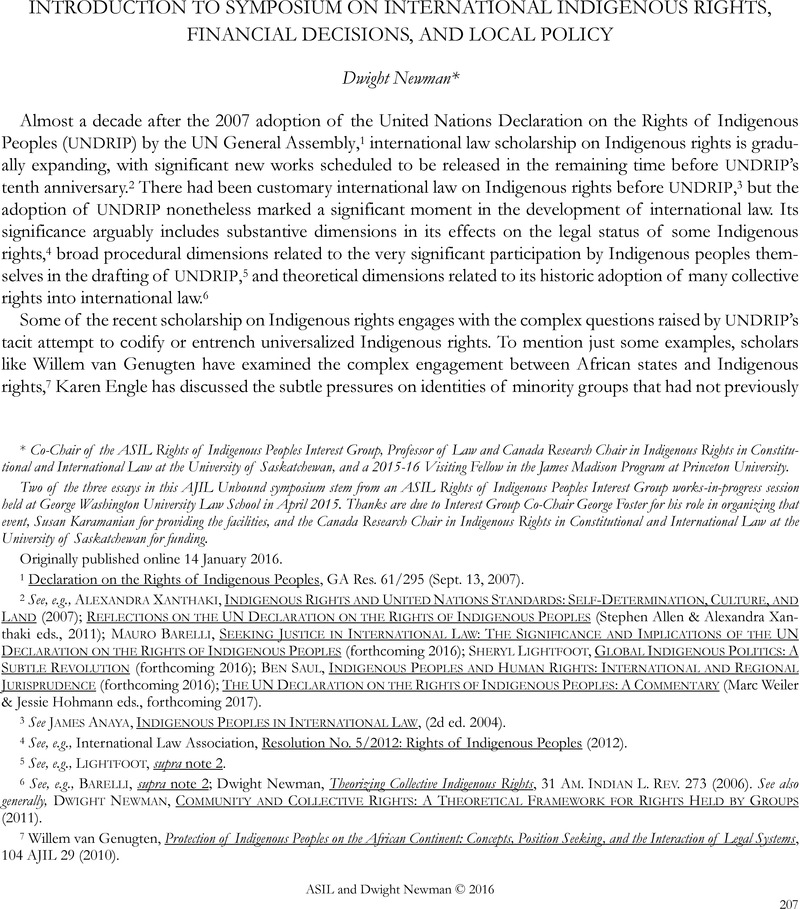No CrossRef data available.
Published online by Cambridge University Press: 20 January 2017

1 Declaration on the Rights of Indigenous Peoples, GA Res. 61/295 (Sept. 13, 2007).
2 See, e.g., Alexandra Xanthaki, Indigenous Rights and United Nations Standards: Self-Determination, Culture, and Land (2007); Reflections on the UN Declaration on the Rights of Indigenous Peoples (Allen, Stephen & Xanthaki, Alexandra eds., 2011)Google Scholar; Mauro Barelli, Seeking Justice in International Law: the Significance and Implications of the UN Declaration on the Rights of Indigenous Peoples (forthcoming 2016); Sheryl Lightfoot, Global Indigenous Politics: A Subtle Revolution (forthcoming 2016); Ben Saul, Indigenous Peoples and Human Rights: International and Regional Jurisprudence (forthcoming 2016); The UN Declaration on the Rights of Indigenous Peoples: A Commentary (Weiler, Marc & Hohmann, Jessie eds., forthcoming 2017)Google Scholar.
3 See Anaya, James, Indigenous Peoples in International Law, (2d ed. 2004)Google Scholar.
4 See, e.g., International Law Association, Resolution No. 5/2012: Rights of Indigenous Peoples (2012).
5 See, e.g., Lightfoot, supra note 2.
6 See, e.g., Barelli, supra note 2; Newman, Dwight, Theorizing Collective Indigenous Rights, 31 Am. Indian L. Rev. 273 (2006)CrossRefGoogle Scholar. See also generally, Dwight Newman, Community and Collective Rights: A Theoretical Framework for Rights Held by Groups (2011).
7 van Genugten, Willem, Protection of Indigenous Peoples on the African Continent: Concepts, Position Seeking, and the Interaction of Legal Systems, 104 AJIL 29 (2010)CrossRefGoogle Scholar.
8 Karen Engle, The Elusive Promise of Indigenous Development: Rights, Culture, Strategy (2010).
9 Gover, Kirsty, Settler-State Political Theory, ‘Canzus’ and the UN Declaration on the Rights of Indigenous Peoples, 26 Eur. J. Int’l L. 345 (2015)CrossRefGoogle Scholar.
10 Hill, Asta, Western Australia’s Remote Indigenous Communities: A Case against Closures and a Call for New Governance, 109 AJIL Unbound 209 (2015)CrossRefGoogle Scholar.
11 Newman, Dwight, Indigenous Title and Its Contextual Economic Implications: Lessons for International Law from Canada’s Tsilhqot’in Decision , 109 AJIL Unbound 215 (2015)CrossRefGoogle Scholar.
12 Odumosu-Ayanu, Ibironke, Indigenous Peoples, International Law, and Extractive Industry Contracts, 109 AJIL Unbound 220 (2015)CrossRefGoogle Scholar.
13 Cf. also, S.J. Rombouts, Having A Say: Indigenous Peoples, International Law, and Free, Prior, and Informed Consent (2014); Cathal M. Doyle, Indigenous Peoples, Title to Territory, and Rights and Resources: the Transformative Role of Free Prior and Informed Consent (2014).
Target article
Protection of Indigenous Peoples on the African Continent: Concepts, Position Seeking, and the Interaction of Legal Systems
Related commentaries (4)
Indigenous Peoples, International Law, and Extractive Industry Contracts
Indigenous Title and its Contextual Economic Implications: Lessons for International Law From Canada’s Tsilhqot’in Decision
Introduction to Symposium on International Indigenous Rights, Financial Decisions, and Local Policy
Western Australia’s Remote Indigenous Communities: A Case Against Closures and a Call For New Governance